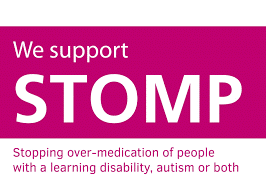What is STOMP
Stopping over medication of people with a learning disability and autistic people (STOMP) is a national NHS England work programme to stop the inappropriate prescribing of psychotropic medications, an identified priority in the NHS Long Term Plan.
STOMP aims to:
- Improve the quality of life of people with a learning disability, autism or both, are prescribed psychotropic medicines.
- Make sure people are only given them for the right reason, in the right amount, for as short as time as possible.
- Improve everyone’s understanding of these medicines and give everyone the confidence to ask why they are need.
- Improve understanding of non-drug treatments and support which may help.
- Make sure the person with their family and paid carers are involved in any decision to start, stop, reduce or continue taking them
Why is STOMP Important
Medication is not always the right answer and can cause major side effects which affect someone's quality of life.
Psychotropic medicines can play an important role in treatment for many mental health conditions when they are used appropriately, for example if the person is at severe risk of harming themselves or others. However alternative non medication treatments and therapies should be offered.
STOMP pledge
Mental Health Trusts across South Yorkshire have signed up to the STOMP Pledge and are making improvements within the learning disability services to ensure that people with a learning disability and/or who are autistic are receiving the right medication, at the right time, for the right reason.
STOMP Principles & Pledge
- Reduce the use of psychotropic medication
- Holistic care
- Informed decisions
- Alternatives to medication
- Regular medication reviews
- Multi-disciplinary approach
About Psychotropic Medications
Psychotropic medications include antipsychotics, antidepressants, anxiolytics (benzodiazepines), anti-seizure medication (antiepileptics), sedatives (including hypnotics) and stimulants.
They affect the working of the brain and impact on a person’s mood, thoughts, perceptions and behaviour.
However, the side effects of these medications can impact on a person’s quality of life. These include (but are not limited to):
- sedation
- weight gain
- dyslipidaemia
- increased diabetic risk
- movement disorder such as extra-pyramidal side effects (EPSE)
- hormonal change such as hyperprolactinaemia
- ECT changes
- sexual dysfunction.
To access easy read medication leaflets please click here
For more information about STOMP easy read medication leaflets in various languages, contact your local NHS Learning Disability team.
Regular medication reviews
The impact of any side effects of psychotropic medication should be regularly weighed against the potential benefits of treatment and discussed with individuals at regular medication reviews.
To ensure continued prescribing remains appropriate, people should receive regular, person-centred, holistic and structured medication reviews from professionals who understand people with a learning disability and autistic people. The review should focus on physical, mental and behavioural wellbeing, with an emphasis on reducing health inequalities and promoting health and quality of life. It is important that people’s experience and feedback is captured when they attend a review.
From the age of 14, people with a learning disability are entitled to an annual health check, and this includes a holistic, structured medication review.
At these reviews, the discussion and offer of alternatives to medication where appropriate, such as sleep hygiene or other non-pharmacological support.
Support for Autistic People
National Autistic Society leaflet on STOMP: this leaflet explains what STOMP is and provides information for those who may be given mental health medications.
Support for People with a Learning Disability
STOMP advocacy guide: this guide explains the role of an advocate in relation to the use of medication and in supporting people to have a better life.
Easy read medication leaflets: these leaflets provide important information about your prescribed medication. For STOMP easy read medication leaflets in different languages please contact your local NHS Learning Disability service for more information.
STOMP Programme core message leaflet (available in easy read and in 9 languages): created in collaboration with MIXIT Theatre group, this leaflet explains what STOMP is and goes through the best ways to support people with their medication.
No medication…? Why…?: this leaflet explains why someone with a learning disability or autistic people may not be prescribed mental health medication to change behaviours that may be challenging.
The Challenging Behaviour Foundation Medication Pathway: this pathway covers what families and carers should find out before their relative starts taking medication. It explores the alternatives to medication, how medication should be monitored and what a family member or carer should do if they have concerns about their relative’s medication.
STOMP and STAMP family guide: this guide for families whose loved one has been prescribed medication recommends the questions to ask and where to find more support.
